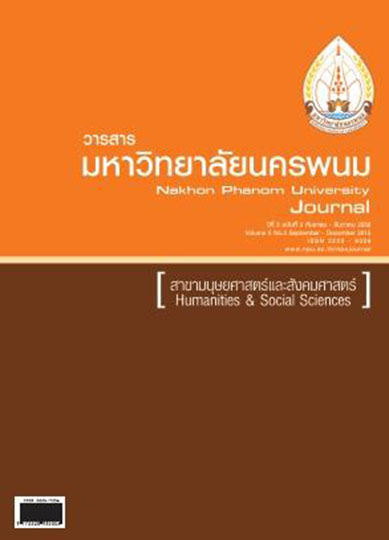ความสัมพันธ์ระหว่างแบบผู้นำกับการจัดการความขัดแย้งของผู้บริหารสถานศึกษาขั้นพื้นฐาน จังหวัดนครพนม
Main Article Content
Abstract
การวิจัยครั้งนี้มีวัตถุประสงค์เพื่อ 1) ศึกษาแบบผู้นำของผู้บริหารสถานศึกษาขั้นพื้นฐาน จังหวัดนครพนม 2) ศึกษาการจัดการความขัดแย้งของผู้บริหารสถานศึกษาขั้นพื้นฐาน จังหวัดนครพนม 3) เปรียบเทียบแบบผู้นำและการจัดการความขัดแย้งของผู้บริหารสถานศึกษาขั้นพื้นฐาน จำแนกตามประเภท และขนาดของโรงเรียน 4) ศึกษาความสัมพันธ์ระหว่างแบบผู้นำกับการจัดการความขัดแย้งของผู้บริหารสถานศึกษาขั้นพื้นฐาน 5) พยากรณ์การจัดการความขัดแย้งของผู้บริหาร โดยใช้ ตัวแปรแบบผู้นำของผู้บริหารเป็นตัวพยากรณ์ กลุ่มตัวอย่างได้แก่ ผู้บริหารสถานศึกษา 319 คน ได้มาโดยสุ่มอย่างง่าย เครื่องมือที่ใช้ได้แก่ แบบสอบถามมาตราส่วนประมาณค่ามีค่าอำนาจจำแนกระหว่าง 0.24–0.70 มีค่าความเชื่อมั่นเท่ากับ 0.90 สถิติที่ใช้การวิเคราะห์ข้อมูล ได้แก่ ร้อยละ ค่าเฉลี่ยส่วนเบี่ยงเบนมาตรฐาน การทดสอบความแปรปรวนทางเดียว สัมประสิทธิ์สหสัมพันธ์อย่างง่าย และการวิเคราะห์ถดถอยพหุคูณแบบเป็นขั้นตอนผลการวิจัยพบว่า 1) แบบผู้นำของผู้บริหารสถานศึกษาขั้นพื้นฐานจังหวัดนครพนมเป็นแบบมิตรสัมพันธ์ 2) การจัดการความขัดแย้งของผู้บริหารสถานศึกษาขั้นพื้นฐานเป็นแบบการร่วมมือ 3) ผลการเปรียบเทียบแบบผู้นำตามประเภทและขนาดโรงเรียนโดยรวมและรายด้านแตกต่างกันอย่างมีนัยสำคัญทางสถิติที่ระดับ .05 โดยแบบผู้นำของผู้บริหารโรงเรียนประถมศึกษาสูงกว่าโรงเรียนขยายโอกาสและมัธยมศึกษา โรงเรียนขนาดเล็กสูงกว่าโรงเรียนขนาดกลางและโรงเรียนขนาดใหญ่ และผลการเปรียบเทียบการจัดการความขัดแย้งตามประเภทและขนาดโรงเรียนโดยรวมและรายด้านแตกต่างกันอย่างมีนัยสำคัญทางสถิติที่ระดับ .05 โดยการจัดการความขัดแย้งของผู้บริหารโรงเรียนประถมศึกษาสูงกว่าโรงเรียนขยายโอกาสและมัธยมศึกษา โรงเรียนขนาดเล็กสูงกว่าโรงเรียนขนาดกลางและโรงเรียนขนาดใหญ่ 4) แบบผู้นำกับการจัดการความขัดแย้งของผู้บริหารสถานศึกษาขั้นพื้นฐาน โดยรวมมีความสัมพันธ์เชิงบวก ทุกด้านอย่างมีนัยสำคัญทางสถิติที่ระดับ .01 5) แบบผู้นำที่สามารถพยากรณ์การจัดการความขัดแย้งของผู้บริหารสถานศึกษาขั้นพื้นฐานจังหวัดนครพนมได้อย่างมีนัยสำคัญทางสถิติที่ระดับ .01 คือ แบบผู้แยกตัว แบบผู้เสียสละและแบบมิตรสัมพันธ์
The purposes of this study were : 1) to investigate the leadership styleofadministrators in basic education schools under Nakhon Phanom Province, 2) to investigate theconflict management ofadministrators in basiceducation schools under Nakhon Phanom Province, 3) to compare the leadership style and the conflict management of administrators in basic education schools under Nakhon Phanom Province classified accordingto status and school classes, 4) to examine the relationship between leadership styles and conflict managementof administrators in basic education schools under Nakhon Phanom Province, and 5) toaspect individualized theconflict management of administrators. A sample of studyselected by stratified random sampling comprised 319 school administrators. The instrument used was a 5-rating scale questionnaire whose discrimination power values ranged between 0.24 and 0.70andreliability value was 0.90Statistics used to analyze data werepercentage, mean, standard deviation, one way ANOVA, simple correlation, and multiple regressionanalysis. The result of this study were as follows : 1) the leadership style of administrators in basic education schools under Nakhon Phanom Province, as a whole , was a related; 2) the conflict management of administrators in basic education schools under Nakhon Phanom Province, as a whole , was by using a collaboration;3) to compare the leadership style classified according to status and school classes by overall and individual aspect of leadership styles of primary school, expand opportunities school and high school were significantly different at the .05 level. The primary school appeared more than those of expand opportunities school and high school. The small size school appeared more than those of medium and large size; to compare the conflict management classified accordingm to status and school classes by overall and individual aspect of conflict management of primary school, expand opportunities school and high school were significantly different at the .05 level. The primary school appeared more than those of expand opportunities school and high school; 4) There were a positive relationship between leadership styles and conflict management of administrators were significantly different at the .01 level; 5) The leadership styles in the aspect of individualized separated, dedicated and related styles could statistical significant predict conflict management were significantly different at the .01 level.


